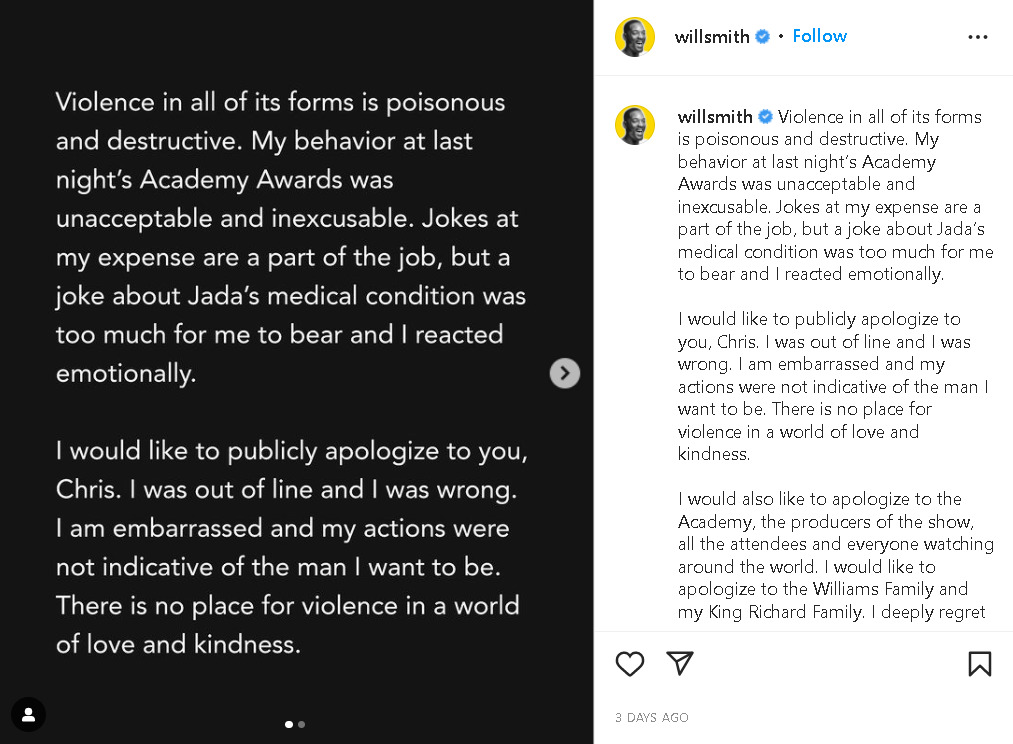Will Smith’s Apology to Chris Rock Is Only 160 Words. It’s a Master Class in Emotional Intelligence
Whether you’re a PR professional or a business owner who made a major mistake, Smith’s apology serves as a case study with invaluable takeaways.

It was the slap heard around the world.
At Sunday night’s Academy Awards, Will Smith shocked fellow actors and millions of viewers when he slapped host Chris Rock across the face on the Oscars stage, after Rock made a joke about Smith’s wife Jada Pinkett Smith’s hair loss, which the actress has said is due to a medical condition.
On Monday, Smith took to Instagram to issue a public apology for his actions.
“My behavior at last night’s Academy Awards was unacceptable and inexcusable,” Smith wrote. “I would like to publicly apologize to you, Chris. I was out of line and I was wrong.”
There’s much more to Smith’s statement, and I must say, it’s one of the best public apologies I’ve ever read. It’s a brilliant lesson in real-life emotional intelligence, the ability to understand and manage emotional behavior. (You can read the full apology via Smith’s Instagram post at the conclusion of this article.)
Whether you’re a public relations professional, or a business owner who made a mistake during an emotional moment, Smith’s apology serves as a case study with numerous valuable takeaways. Let’s break them down, and see how they can help you.
The emotional hijack
In his opening paragraph, Smith identifies exactly where things went wrong.
“Jokes at my expense are a part of the job,” he explains, “but a joke about Jada’s medical condition was too much for me to bear and I reacted emotionally.”
I reacted emotionally.
What Smith experienced wasn’t just a poor lapse in judgment. It was an example of what psychologists refer to as an emotional hijack, or an amygdala hijack.
When it comes to higher level executive functions, such as the capacity to think through a decision or exercise self-control, we typically engage the frontal lobe(s), the largest part of the brain. But when we feel some type of emotional threat, the amygdala, an almond shaped structure found deep in the brain, hijacks the process. This often results in a fight, flight, or freeze response.
If Smith interpreted Rock’s joke as an attack on his wife, that could then lead Smith to react emotionally–in this case, to take an action he would later regret.
Undoubtedly, you can relate to Smith. We’ve all made mistakes in emotional moments, said or done things we wish we could take back. Of course, it would be great if you could identify those triggers ahead of time, but often it will happen as it did to Smith: We don’t realize what we’ve done until it’s too late.
But instead of ignoring the situation or minimizing what’s happened, Smith gets things off to a great start by acknowledging what happened and directly apologizing.
A one-sentence master class
“I am embarrassed and my actions were not indicative of the man I want to be,” Smith continues.
This sentence alone is a master class in emotional intelligence. Let me explain why.
Embarrassment is a very difficult emotion to deal with. When we’re embarrassed, the last thing we want to do is come out in the open and admit wrongdoing; we prefer to hide under a rock. By acknowledging his embarrassment, Smith demonstrates courage and a willingness to face up to his actions.
Then, Smith goes further.
Many times when we see apologies like this, the person apologizing claims that their actions are not representative of the person they are. But in saying that, they minimize what they’ve done and fail to realize that this is the person they are, that they, like all of us, need hard work to address a demonstrated weakness.
But when Smith says his actions aren’t indicative of the man he wants to be, he doesn’t claim to be something that he isn’t. It’s as if he were saying: “This is who I am, but it’s not who I want to be. I want to be better. I need to be better.”
Smith then emphasizes this point with a powerful, six-word sentence:
“I am a work in progress.”
So, the next time you have an emotional moment and need to apologize, remember this statement. It’s only 11 sentences, 160 words. Yes, it may have been crafted with the help of publicists and PR professionals, but that doesn’t make it meaningless–if Smith actually applies it. With these few words Smith shows that apologies don’t have to be long, empty, or drawn out.
With those few words, Smith’s statement did everything a good apology can do: It showed regret, remorse, vulnerability, authenticity, and humility–qualities that will go a long way in burying the hatchet with those you offended, make amends, and help you to be better the next time.
Because, after all, we are all works in progress.


Responses